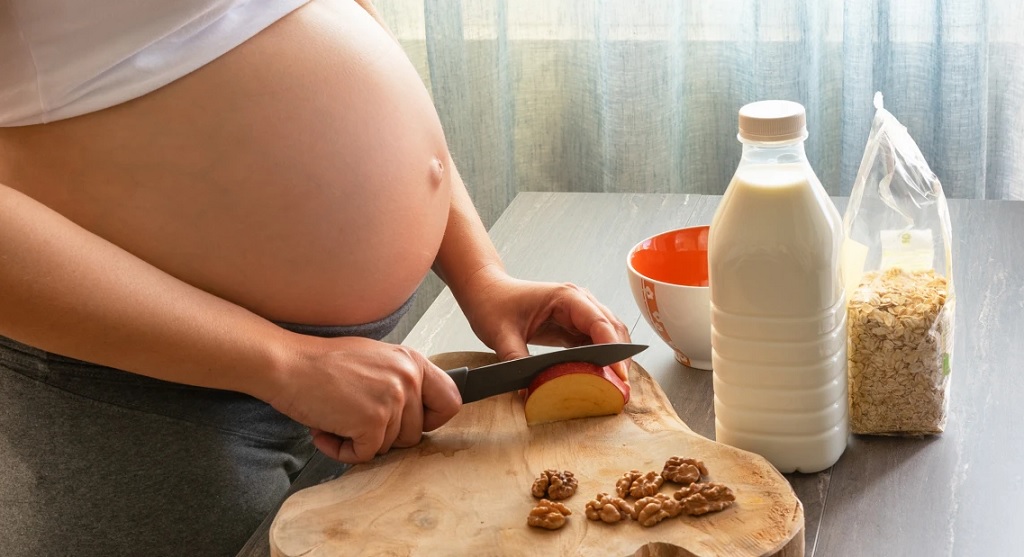Nutritional Requirements During Pregnancy: Food Components You Must Include in Your Diet
It is important for pregnant women to include the right food components in their diets in order to ensure that their unborn children receive the proper nutrients. Some of the most important food components that pregnant women should eat are calcium, iron, and folic acid. In addition, it is also important for pregnant women to consume plenty of water and stay hydrated.

The Importance of Calcium During Pregnancy
Calcium is important for pregnant women because it helps to build strong bones and teeth in their unborn children. In addition, calcium also helps to regulate blood pressure and contractions during labor. Pregnant women should aim to consume at least 1,000 mg of calcium per day. Some good sources of calcium include dairy products, leafy green vegetables, and canned salmon with bones.
The Importance of Iron During Pregnancy
Iron is also important for pregnant women because it helps to form red blood cells in their unborn children. Iron also helps to prevent anemia, which can cause fatigue and other health problems. Pregnant women should aim to consume at least 27 mg of iron per day. Some good sources of iron include red meat, poultry, fish, legumes, and fortified breakfast cereals.
The Importance of Folic Acid During Pregnancy
Folic acid is essential for pregnant women because it helps to prevent birth defects of the brain and spine. Pregnant women should aim to consume at least 400 mcg of folate (a form of folic acid) per day. Some good sources of folate include leafy green vegetables, legumes, nuts, and fortified breakfast cereals. Consumption of the best cereal for pregnancy will actually give you a boost of folic acid and energy.
The Importance of Protein-Rich Foods During Pregnancy
Protein is essential for the growth and development of the baby. Good sources of protein include meat, poultry, fish, legumes, and eggs. Pregnant women need at least 70 grams of protein a day.
Importance of Fluids
Pregnant women need to drink at least eight glasses of fluids a day. This includes water, milk, and juice. Avoid caffeine-containing beverages such as coffee, tea, and soda.
How to Meet Your Nutritional Requirements During Pregnancy
In order to meet your nutritional requirements during pregnancy, you should include a variety of foods in your diet. Some important food components to include are protein, calcium, vitamin D, and iron. You also need to have the best probiotics for pregnancy to keep your gut health optimum. You can meet your protein needs by eating lean meats, poultry, fish, eggs, beans, lentils, and nuts. To meet your calcium needs, you should eat dairy products and fortified foods like juices and cereals. Vitamin D is found in fatty fish like salmon and tuna, and you can also get it from fortified foods and supplements. Iron can be found in lean red meat, poultry, fish, legumes, leafy green vegetables, and dried fruits.
What to Eat and What to Avoid While Pregnant
Foods You Should Eat While Pregnant:
– Lean protein: Fish, poultry, beans, and nuts are all good sources of lean protein.
– Fruits and vegetables: Try to include a variety of fruits and vegetables in your diet every day.
– Whole grains: Whole grains provide fiber and other important nutrients.
– Dairy: Choose low-fat or fat-free dairy products whenever possible.
Foods to Avoid While Pregnant:
– Raw meat, poultry, and fish: These can contain harmful bacteria that can make you sick.
– unpasteurized milk: Unpasteurized milk may contain harmful bacteria.
– Soft cheese: Soft cheeses such as blue cheese and feta can contain harmful bacteria.
Conclusion
Maintaining a healthy and balanced diet during pregnancy is of utmost importance for both the mother and her unborn child. In order to ensure that you are getting all the important nutrients your body needs, it is important to include certain food components in your diet. This article has outlined some of the most important food components that pregnant women should make sure they are consuming on a regular basis. By following these guidelines, you can help give your baby a good start in life and reduce the risk of health complications later on.